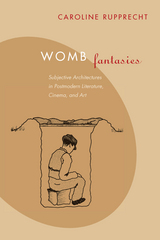2 books by Rupprecht, Caroline

Subject to Delusions
Narcissism, Modernism, Gender
Caroline Rupprecht
Northwestern University Press, 2006
A figure of reflexivity, narcissism describes a relation between self and other mediated through the mirror or reflection. As such, the concept might help us to consider how what we come to know as the other, or the object, is always the result of a process of image-making. It is in this suggestive sense that narcissism interests Caroline Rupprecht in Subject to Delusions.
Because "the other," or the object, is constructed, Rupprecht finds in narcissism the possibility of rewriting notions of identity. She then pursues this possibility through modern literary texts in which narcissism acts as a structuring principle—works by the expressionist poet Henriette Hardenberg, the American avant-garde novelist Djuna Barnes, and the surrealist writer Unica Zürn—reading each within the critical framework of the evolution of the idea of narcissism in psychoanalytic theory. All written by women, these works also raise questions of gender and sexuality. Moreover, because each of these authors belonged to or was influenced by a particular literary movement, Rupprecht's analysis advances our understanding of the poetics of these movements and of the movement of modernism itself. Underlying all is a deep engagement with psychoanalytic theory. Drawing on Freud, his contemporaries and rivals, Jacques Lacan, Melanie Klein, and many other theorists, Rupprecht interrogates preconceived notions of identity and subjectivity through her readings of the "transgressive potential" of narcissism as it is enacted in the texts under study. Bringing the works of literary modernism and psychoanalysis together in an innovative and provocative way, her book succeeds in enhancing our sense of both, and in clarifying the complex role of narcissism in our cultural narrative.
Because "the other," or the object, is constructed, Rupprecht finds in narcissism the possibility of rewriting notions of identity. She then pursues this possibility through modern literary texts in which narcissism acts as a structuring principle—works by the expressionist poet Henriette Hardenberg, the American avant-garde novelist Djuna Barnes, and the surrealist writer Unica Zürn—reading each within the critical framework of the evolution of the idea of narcissism in psychoanalytic theory. All written by women, these works also raise questions of gender and sexuality. Moreover, because each of these authors belonged to or was influenced by a particular literary movement, Rupprecht's analysis advances our understanding of the poetics of these movements and of the movement of modernism itself. Underlying all is a deep engagement with psychoanalytic theory. Drawing on Freud, his contemporaries and rivals, Jacques Lacan, Melanie Klein, and many other theorists, Rupprecht interrogates preconceived notions of identity and subjectivity through her readings of the "transgressive potential" of narcissism as it is enacted in the texts under study. Bringing the works of literary modernism and psychoanalysis together in an innovative and provocative way, her book succeeds in enhancing our sense of both, and in clarifying the complex role of narcissism in our cultural narrative.
[more]

Womb Fantasies
Subjective Architectures in Postmodern Literature, Cinema, and Art
Caroline Rupprecht
Northwestern University Press, 2013
Womb Fantasies examines the womb, an invisible and mysterious space invested with allegorical significance, as a metaphorical space in postwar cinematic and literary texts grappling with the trauma of post-holocaust, postmodern existence. In addition, it examines the representation of visible spaces in the texts in terms of their attribution with womb-like qualities. The framing of the study historically within the postwar era begins with a discussion of Eero Saarinen’s Womb Chair in the context of the Cold War’s need for safety in light of the threat of nuclear destruction, and ranges over films such as Marguerite Duras’ and Alan Resnais’ film Hiroshima mon amour and Duras’ novel The Vice-Consul, exploring the ways that such cultural texts fantasize the womb as a response to trauma, defined as the compulsive need to return to the site of loss, a place envisioned as both a secure space and a prison. The womb fantasy is linked to the desire to recreate an identity that is new and original but ahistorical.
[more]
READERS
Browse our collection.
PUBLISHERS
See BiblioVault's publisher services.
STUDENT SERVICES
Files for college accessibility offices.
UChicago Accessibility Resources
home | accessibility | search | about | contact us
BiblioVault ® 2001 - 2024
The University of Chicago Press









